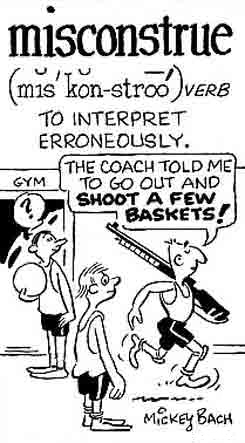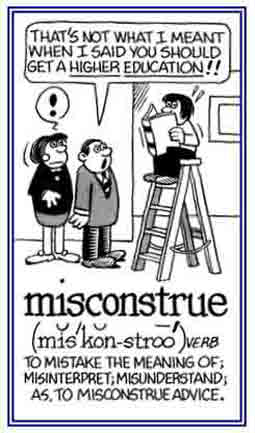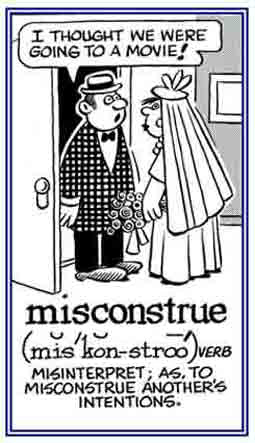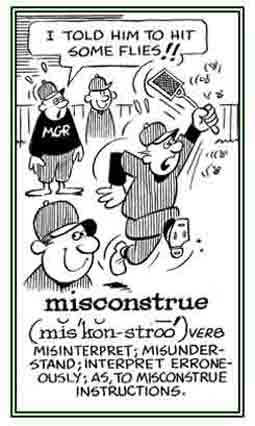stru-, struct-, -structure, -struction, -structive
(Latin: to build, to build up; to pile; to construct; to place together, to arrange)
light industry (s), light industries (pl) (noun forms)
The part of industry that involves the production of small goods; for example, electronic equipment.
misconstruction (s), misconstructions (pl) (noun forms)
1. An inaccurate explanation, interpretation, or report; a misunderstanding.
2. A faulty grammatical construction, especially of a sentence or clause.
2. A faulty grammatical construction, especially of a sentence or clause.
misconstructive (adjective)
A reference to a faulty understanding or interpretation of something.
misconstrue (verb), misconstrues; misconstrued; misconstruing
To understand, or to interpret, something incorrectly; or to mistake the meaning of something: Monroe said his words in the political speech were misconstrued by his opponents.

© ALL rights are reserved.

© ALL rights are reserved.

© ALL rights are reserved.

© ALL rights are reserved.
Go to this Word A Day Revisited Index
Joe, are you misconstruing what Jennifer said?




Go to this Word A Day Revisited Index
so you can see more Mickey Bach illustrations.
nanoinstructions (pl) (noun)
In microprogramming control organization, the decoded microinstructions stored in lower-level control memory.
nanostructure (s), nanostructure (pl) (noun forms)
1. Any manufactured structure having a scale between molecular (smallest particle) and microscopic (so small that it can only be seen using a microscope).
2. An extremely small device, material, or particle; for example, the technology on a semiconductor chip: "The company's objective is to design materials for nanostructure computer components."
3. Something which has a physical dimension ranging from clusters of atoms to dimensional layers.
2. An extremely small device, material, or particle; for example, the technology on a semiconductor chip: "The company's objective is to design materials for nanostructure computer components."
3. Something which has a physical dimension ranging from clusters of atoms to dimensional layers.
Nemo tenetur edere instrumenta contra se.
No one is bound to produce writings against himself or herself.
A rule of the Roman law, adhered to in criminal prosecutions, but departed from in civil questions.
1. The unableness of interpreting something or assigning a meaning to: The essay that Susan wrote was full of nonconstruabilities, all of which the teacher could make no sense of.
2. The incapability of deducing by inference or interpretation: Doug tried to decipher Jane's intentions from her gestures, but the situation ended up being one of nonconstruability.
2. The incapability of deducing by inference or interpretation: Doug tried to decipher Jane's intentions from her gestures, but the situation ended up being one of nonconstruability.
nonconstruable (adjective), more nonconstruable, most nonconstruable
Unable to interpret or to understand what someone means: Jack stated, "I apologize if I've misinterpreted your statements, but they were just simply nonconstruable."
nondestructive (adjective)
1. Relating to, or being a process which does not result in damage to the material under investigation or testing.
2. Not causing nor capable of causing destruction.
2. Not causing nor capable of causing destruction.
nondestructive testing, NDT
Any of several methods of detecting flaws in metals without causing damage.
The most common techniques involve the use of X-rays, gamma rays, and ultrasonic vibrations for testing the construction of the metals.
nondestructively (adverb)
A reference to, or relating to, or being a process that does not result in damage to the material under investigation or testing.
nondestructiveness (noun)
That which causes no harm or damage to whatever is being examined or used.
obstruct, obstructs, obstructed, obstructing (verb forms)
1. To block or to fill (a passage) with obstacles or an obstacle: "A fallen tree obstructed the road."
2. To impede, to retard, or to interfere with; to hinder: "A lack of money obstructed the project."
3. To be in the way and to prevent a clear view of something: "A big spectator obstructed our view of the stage."
4. Etymology: from the Latin prefix ob-, "before" + struere, "to build, to pile up"; hence, to build or to pile up an obstacle in front of something.
2. To impede, to retard, or to interfere with; to hinder: "A lack of money obstructed the project."
3. To be in the way and to prevent a clear view of something: "A big spectator obstructed our view of the stage."
4. Etymology: from the Latin prefix ob-, "before" + struere, "to build, to pile up"; hence, to build or to pile up an obstacle in front of something.
obstruction (s), obstructions (pl) (noun forms)
1. Something which blocks a path, passage, door, etc. so that it is difficult or impossible for someone or something to move along or through it.
2. The act of causing a delay or an attempt to cause a delay in the conduct of business; especially, in a legislative body.
3. An act of blocking or hindering someone or something: "There must be an obstruction in the drainpipe because the water will not go out of the tub."
2. The act of causing a delay or an attempt to cause a delay in the conduct of business; especially, in a legislative body.
3. An act of blocking or hindering someone or something: "There must be an obstruction in the drainpipe because the water will not go out of the tub."


